|
|
|
Sort Order |
|
|
|
Items / Page
|
|
|
|
|
|
|
| Srl | Item |
| 1 |
ID:
116653
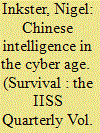

|
|
|
|
|
| Publication |
2013.
|
| Summary/Abstract |
In comparison with other major powers, relatively little has been written about the modern capabilities of the Chinese intelligence agencies. The public consciousness of Western audiences is certainly not infused with dramatic episodes equivalent to the United Kingdom's code-breaking successes against Nazi Germany during the Second World War, or the spy/counter-spy narrative which characterised the Cold War. Within China itself, there is such a narrative, but it is situated squarely within the context of the anti-Japanese war and in the post-war struggle between the Chinese Communist Party (CCP) and the Kuomintang (KMT), both campaigns in which intelligence played a significant role. This era is amply covered in both academic writings and an increasing array of novels, films and television series which form part of the CCP's ongoing Patriotic Education Campaign, established in the aftermath of the 1989 June 4 Incident.1 Far less coverage is devoted to China's contemporary intelligence capabilities, in particular in terms of successes in collecting against foreign targets. There is nothing remotely comparable to the huge expansion in academic writings on all aspects of intelligence that has developed in the West since the end of the Cold War.
|
|
|
|
|
|
|
|
|
|
|
|
|
|
|
|
| 2 |
ID:
116654
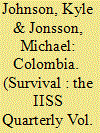

|
|
|
|
|
| Publication |
2013.
|
| Summary/Abstract |
Is the world's longest active civil war finally coming to an end? In November 2012 the Colombian government and the left-wing guerrilla group Fuerzas Armadas Revolucionarias de Colombia (FARC) began full-fledged peace negotiations in Havana, Cuba. But the mood in Bogotá is ambivalent, with a yearning for peace tempered by a deep-seated distrust of FARC and its negotiating tactics.
|
|
|
|
|
|
|
|
|
|
|
|
|
|
|
|
| 3 |
ID:
116658
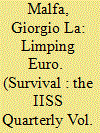

|
|
|
|
|
| Publication |
2013.
|
| Summary/Abstract |
The Maastricht Treaty of 1992 launched European Monetary Union, outlining a three-phase process towards the euro. The first two stages were preparatory and focused on the new system's organisational aspects, with special reference to the workings of the European Central Bank and economic and financial convergence among candidate members. Convergence, based on the so-called Maastricht criteria, would decide which countries were to be allowed to take part in the third and final phase of the EMU. That phase began on 1 January 1999 when, for the 11 countries that had met the criteria, monetary policy was transferred from national central banks to the ECB. Greece joined later, and the start of 2002 saw the changeover from the 12 national currencies to the euro. By then, Europe's boldest project since the integration process of the 1950s was fully in place.
|
|
|
|
|
|
|
|
|
|
|
|
|
|
|
|
| 4 |
ID:
116656
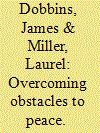

|
|
|
|
|
| Publication |
2013.
|
| Summary/Abstract |
Societies emerging from conflict face many obstacles to achieving enduring peace, economic development and political reform. These include sectarian divides, historical animosities, poverty, weak institutions and malign neighbours. Some analysts have found these local factors so various as to argue that there can be no generic approaches to post-conflict stabilisation and reconstruction (known more colloquially as nation-building). Others have argued that these obstacles are so daunting as to make the whole nation-building project too difficult and expensive to even attempt. Yet of 20 major peacekeeping or peace-enforcement interventions undertaken since the end of the Cold War, 16 have produced greater peace, 18 saw increases in democratisation (according to Freedom House), 17 saw improvements in government effectiveness (according to the World Bank), 18 experienced economic growth - indeed, generally faster growth than other countries in their region - and 18 saw improvements in their human development, as measured by the UN.
|
|
|
|
|
|
|
|
|
|
|
|
|
|
|
|
| 5 |
ID:
116657


|
|
|
|
|
| Publication |
2012.
|
| Summary/Abstract |
If US policymakers did not fully understand before 2011 how important the so-called 'Arab street' is in the politics of the Middle East and North Africa, they surely do by now. Whether this principle extends to other parts of the Muslim world is not yet clear, but in Pakistan, one of America's most important Muslim-majority allies, the effect of public opinion on the country's politics, including its foreign policy, may be critical.
Despite an apparent alienation between much of Pakistan's elite and the public at large, many observers are prepared to accept that public opinion drives the behaviour of Pakistan's civilian politicians. But public opinion is also a key driver of choices made by the Pakistan military. Western observers and policymakers tend to assume that senior military officers run the show and have been slow to realise that Pakistani behaviour, even among the upper echelons of the army, is powerfully shaped from below.
|
|
|
|
|
|
|
|
|
|
|
|
|
|
|
|
| 6 |
ID:
116652
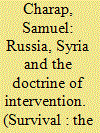

|
|
|
|
|
| Publication |
2013.
|
| Summary/Abstract |
Since the beginning of the Syrian crisis, there have been intermittent hopes that Moscow might play a constructive diplomatic role in resolving it. But the focus on Russia has been deeply misleading. Russia, for reasons that have little to do with Syria itself, was never going to be part of the solution to the crisis - at least on terms that the West and the Syrian opposition could accept. Further, Russia's centrality to international diplomacy on this issue and its seeming obstinacy expose deep flaws in post-Cold War Western doctrine on international intervention. Russia's centrality when it comes to Syria is more a function of those flaws than anything else.
|
|
|
|
|
|
|
|
|
|
|
|
|
|
|
|
| 7 |
ID:
116655
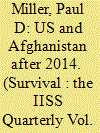

|
|
|
|
|
| Publication |
2013.
|
| Summary/Abstract |
The United States is not scheduled to withdraw from Afghanistan in 2014. President Barack Obama made clear in his May 2012 speech in Kabul that the United States would continue to train Afghan security forces and undertake counter-terrorism operations, which are likely to require thousands of US troops to operate in the country for years to come. The year 2014 is a date for transition, not withdrawal, and the international community has pledged to hand over leadership for security to the Afghan government - no more, no less. Afghan leadership will come with a heavy helping hand from the continued presence of international partners.
|
|
|
|
|
|
|
|
|
|
|
|
|
|
|
|
| 8 |
ID:
116651
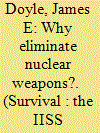

|
|
|
|
|
| Publication |
2013.
|
| Summary/Abstract |
On 5 April 2009 in Prague, US President Barack Obama asserted the United States' commitment to 'seek the peace and security of a world without nuclear weapons'. He was adding his voice and the efforts of his administration to the growing number of world leaders, citizens and civil-society organisations seeking the elimination of such weapons.1 Banning the bomb has been a passionate and often popular crusade since its creation and first use, but in all that time it has never been a serious strategic objective for any state that possessed nuclear weapons.2 Why would a sitting US president take the political and strategic risk of declaring that progress towards this goal was a key element of America's national security policy?
|
|
|
|
|
|
|
|
|
|
|
|
|
|
|
|
|
|
|
|
|